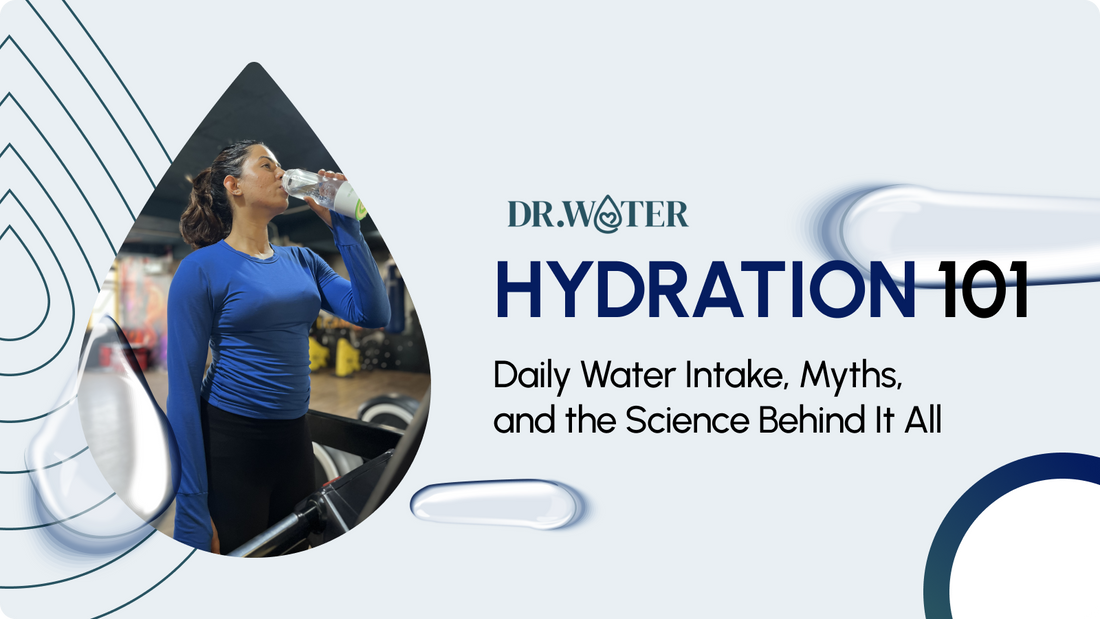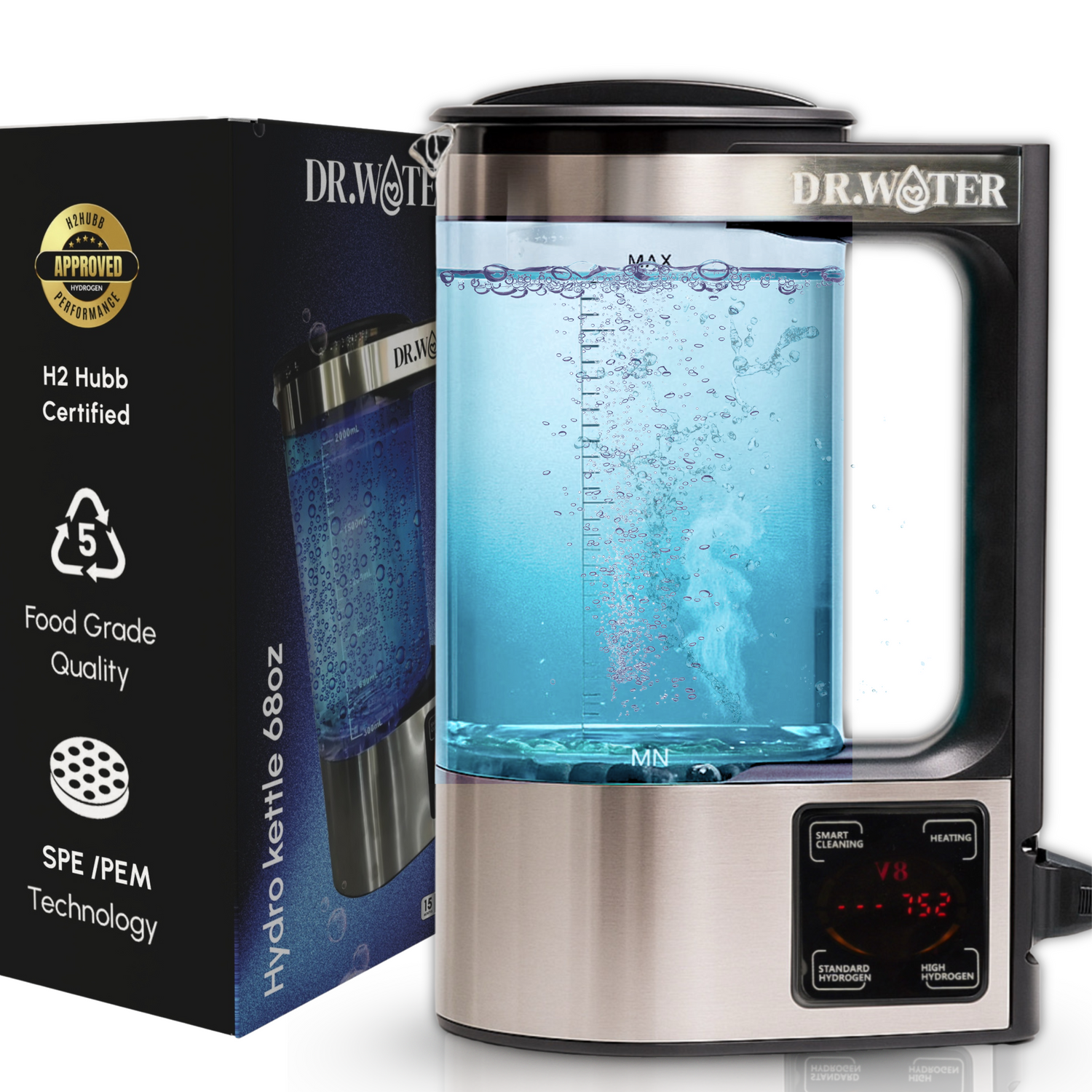
Hydration 101: Daily Water Intake, Myths, and the Science Behind It All
Share
Summary
|
Water is the fuel that keeps our bodies running. Yet millions of people walk around dehydrated daily without even realizing it. Fatigue, headaches, and sluggish digestion? Often, the culprit is simply not drinking enough water.
But the question arises: How much water do we really need? You've probably heard the "eight glasses a day" rule. And while it's a good rule of thumb to follow, it isn't the truth.
Hydration isn't one-size-fits-all. Your body's needs depend on factors like activity level, climate, and even what you eat.
In this blog, we'll try to answer why hydration is so important, how much water you need to drink daily, and, most importantly, how you can make drinking water less boring.
Why Hydration Is Important: The Science Behind It
The human body is approximately 60% water, with specific organs containing even higher percentages, which is precisely why it's important to take hydration seriously.
Every biochemical reaction in your body requires water, and a lack of proper hydration can lead to a cascade of negative effects, which can range anywhere from sluggish metabolism to serious health risks.
Here's how water directly influences bodily functions:
Transports Nutrients
- Blood Runs on Water: With over 90% water content, blood is your body’s highway for delivering oxygen, glucose, amino acids, and vitamins to every cell.
-
When water levels drop, blood thickens, circulation slows, and nutrient delivery weakens, leaving you feeling sluggish, fatigued, and drained.
Cellular Function
- Proper hydration keeps your heart pumping and your cells nourished. It regulates blood pressure, prevents fatigue, and optimizes metabolism.
-
Simply put, when you drink enough water, your body runs like a well-oiled machine—efficient, energized, and thriving.
Temperature Regulation
- Water is your body's built-in cooling system. It regulates your body temperature through sweat and evaporation.
-
Without enough hydration, overheating kicks in faster, which can leave you drained, dizzy, and struggling to keep up.
Cognitive Performance
- Even mild dehydration can cloud your mind, affecting mood, focus, and memory. Studies show that losing just 2–2.8% of body water can impair short-term memory, perception, and motor skills.
-
This is especially true in kids, older adults, and athletes.
Digestive Health
- It's true that water supports digestion, but its effect on constipation largely depends on hydration levels.
-
Drinking more water helps only if you're dehydrated. In fact, low fiber in diet can worsen constipation for older people and individuals.
Joint and Muscle Health
- Synovial fluid, which cushions joints, is primarily composed of water. It acts as your body's natural shock absorber, keeping joints cushioned and muscles strong.
-
A study found that even mild dehydration (1% body mass loss) can impair muscle endurance, power, and strength in healthy, active older men.
How to Tell If You're Dehydrated (Beyond Just Feeling Thirsty)
Thirst is an obvious sign, but by the time you feel it, you’re already mildly dehydrated. Here are some lesser-known indicators of dehydration
- You might feel moody and irritable – Even slight dehydration (1-2% body weight loss) can increase anxiety, fatigue, and confusion.
- Dry Eyes & Blurred Vision: Dehydration reduces tear production, making eyes feel dry and strained.
-
Cool, Clammy Skin (Not Just Dry): While most associate dehydration with dryness, it can also cause cold and clammy skin due to reduced circulation and poor temperature regulation.
What Happens When You're Dehydrated?
Dehydration occurs when the body loses more fluids than it takes in. It can cause a disruption in your body's normal physiological processes. These are some of the most common dehydration symptoms:
Your Brain Slows Down
-
A study found that dehydrated participants performed worse on memory and reaction tests, showing increased fatigue and anxiety.
Your Heart Has to Work Harder
- When dehydrated, blood volume drops, forcing the heart to pump faster to maintain blood pressure.
-
Research shows that dehydrated athletes had significantly higher heart rates and lower endurance levels.
Your Kidneys Struggle
-
A study found that people who drank less than 1 liter per day had a higher risk of kidney stone formation.
Your Skin Heals Slower
-
Dehydration can slow down wound healing by reducing blood flow and oxygen supply to damaged tissues. Adequate hydration also strengthens the skin barrier.
You Crave More Sugar
-
Your liver needs water to release stored glycogen. When fluids are low, the body struggles to break down glycogen for energy, triggering sugar cravings.
Increased Fatigue and Migraines
- When dehydrated, the brain temporarily shrinks due to fluid loss, pulling away from the skull and activating pain receptors.
-
A Neurology study found that dehydration-induced headaches improve within 30 minutes of drinking water. For migraine sufferers, dehydration can be a major trigger.
Your Body Becomes Extra Sensitive to Pain
- Dehydration throws off essential electrolytes like sodium and potassium, disrupting nerve signaling and making your body more sensitive to pain.
-
It’s not just headaches—all types of pain can feel more intense when you're dehydrated. Your body struggles to regulate discomfort without enough fluids.
How Much Water Do You Really Need? Science Has Surprising Answers
We've all heard the "8 glasses a day" rule, but is that really the magic number? The truth is that water needs vary from person to person, and science offers some surprising insights into how much we should actually drink.
1. One Size Doesn't Fit All
- General Recommendations: Men should aim for 3.7 liters (125 oz) per day, while women need 2.7 liters (91 oz)—but this includes fluids from all sources, not just water (Sawka et al., 2005).
- Hydrating Foods Matter: Eating water-rich fruits and veggies reduces your water needs compared to a processed food diet.
- Pregnancy & Breastfeeding: Water needs to increase to 3–3.8 liters per day to support higher fluid demands.
-
Factors like climate, activity level, and diet influence individual hydration requirements.
2. Listen to Your Thirst, Your Body Knows Best
- Forget arbitrary numbers. Your thirst mechanism is smarter than you think.
-
A study found that when people were forced to drink more water than they needed, their brains activated a "swallowing inhibition" response, making it physically harder to drink.
3. Coffee and Tea Still Count (Yes, Really!)
- A study compared hydration levels in people drinking coffee versus water and found no significant difference. Caffeinated beverages contribute to total fluid intake and don't cause dehydration unless consumed in extreme amounts.
4. Your Body Stores Water, So Timing Matters
- Drinking too much water all at once isn't efficient because your kidneys can only process about 0.8 to 1.0 liters per hour.
- So smaller, more frequent sips can be better retained in the body than chugging large amounts at once.
5.Hot Weather and High Altitudes Increase Your Needs
-
If you live in a hot climate or at a high altitude, your hydration needs skyrocket. This study found that high temperatures increase sweat loss, while high altitudes speed up breathing, causing more fluid to escape through respiration.
Now that you know how much water your body needs, the next challenge is making hydration enjoyable. Let’s explore some creative ways to keep your water intake exciting without compromising or adding to its benefits.
Keeping Up with Hydration Without Losing Its Benefits
We get it! Water is essential but can be boring. Let’s spice it up naturally—here’s how!
1. Infused Water
A simple way to make water more enjoyable is by adding fresh fruits, herbs, or veggies. Not only does this enhance taste, but it also delivers added health benefits:
- Lemon & Mint – Refreshing, packed with vitamin C, and great for digestion.
- Cucumber & Ginger – Anti-inflammatory and helps fight bloating.
-
Berry & Basil – Rich in antioxidants and supports immunity.
2. Herbal Teas
Caffeine-free herbal teas, such as chamomile, hibiscus, or peppermint, are delicious ways to stay hydrated while soothing digestion, reducing stress, and delivering antioxidants.
3. Hydrogen Water
A wellness-focused upgrade to the traditional H2O, hydrogen-infused water is gaining attention for its potential performance and recovery benefits. Early studies have discussed that hydrogen water may:
- Fight fatigue and boost energy levels
- Improve muscle recovery and athletic performance
-
Reduce oxidative stress and support heart health
4. Coconut Water
Coconut water is nature's electrolyte goldmine, loaded with potassium, sodium, and magnesium. It is an excellent post-workout hydrator. But it's best not to overdo it, as it contains natural sugars, so moderation is key.
Hydration Myths VS Facts - At a Glance
Dr. Water Hydrogen Bottles: A Smarter Choice
While regular water is essential for hydration, hydrogen water takes it a step further by infusing molecular hydrogen (H₂) into your drink. This tiny molecule has been extensively studied for its antioxidant and anti-inflammatory properties, helping to combat oxidative stress—the root cause of aging and many chronic diseases.
- Deep Cellular Hydration: Hydrogen-rich water absorbs more efficiently, reaching cells where it's needed most.
- Powerful Antioxidant Protection: It helps neutralize free radicals, reduce oxidative stress, and support overall health.
- Boosts Energy & Recovery: Research suggests it can enhance energy, speed up post-exercise recovery, and support brain function.
Beyond its potential health benefits, Dr. Water hydrogen bottles also excel in purity and absorption. High-quality SPE + PEM technology ensures that only pure molecular hydrogen is infused into the water.
This eliminates harmful byproducts like ozone or chlorine that some low-grade hydrogen generators produce. This means you’re getting the cleanest, most effective form of hydration possible.
Conclusion
Water quenches your thirst first, but behind the scenes, it works to keep your body in peak condition, ensuring energy, clarity, and overall well-being. Yet, so many of us underestimate how much our bodies truly need, waiting for thirst to remind us when it's already too late.
If you're looking to up your hydration game, why not go beyond just water? Dr. Water’s Hydrogen Water Bottle infuses your regular water with molecular hydrogen, a powerful antioxidant that supports recovery, energy, and cellular health.
Get yourself a simple, effective way to hydrate smarter, not just more.

